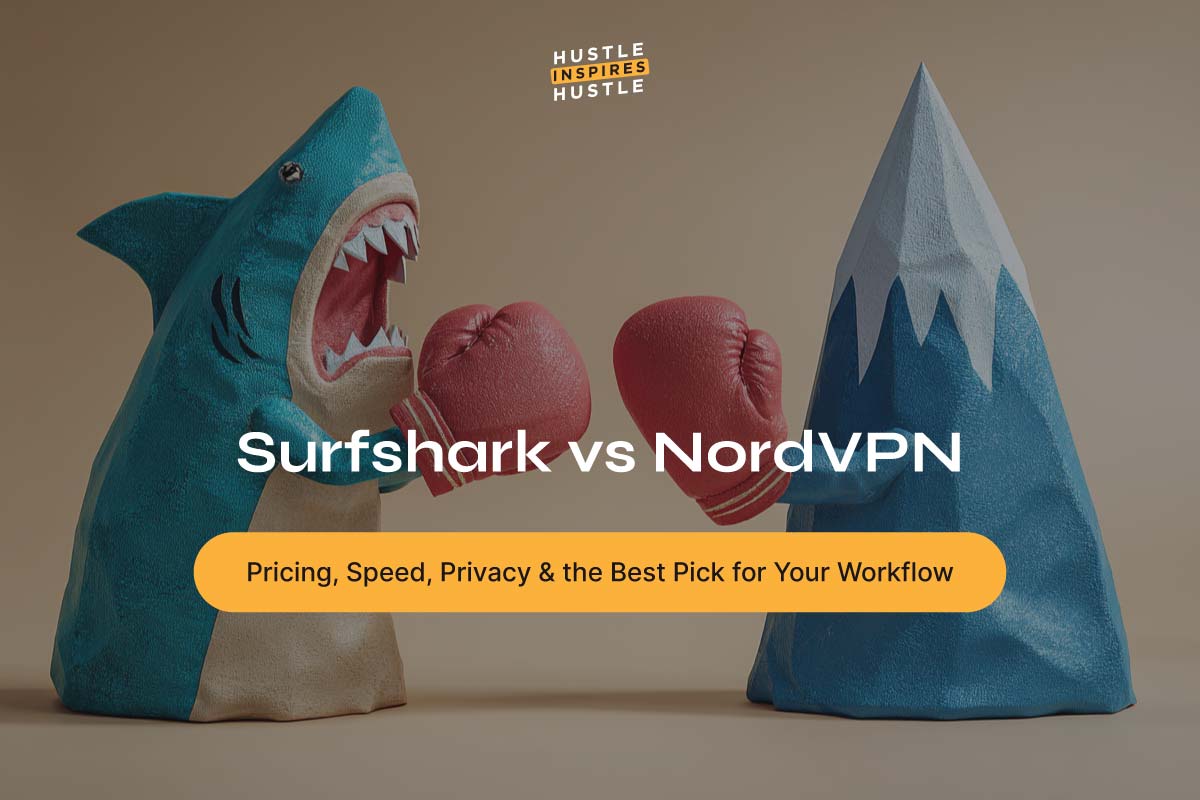Top 50 Famous Entrepreneurs in the World Who Changed Business Forever
From tech giants to cultural icons, discover 50 famous entrepreneurs and the strategies that helped them build lasting businesses.

The Surfshark vs NordVPN decision is a choice you feel in your workflow. You need private, fast, steady connections that just work while you upload, stream, and jump between devices.
So let’s cut noise, keep it real, and help you pick with confidence.
You will see what matters for your budget, your gear, and your day. We’ll show you where each service wins so you can move on with clarity and momentum.
Quick side-by-side picks on price, speed, privacy, tools, support today.
Quick picks at a glance: Surfshark leads in affordability and unlimited devices; NordVPN leads speed consistency and privacy pedigree. For solo founders, small teams, travel creators, streamers, gamers, researchers, read on.
Juggle lots of screens? Surfshark keeps pace without nickel-and-diming each device.
You get unlimited devices, so your phone, tablet, laptop, and TV boxes stay covered together. Setup feels simple, and Quick Connect gets you online in a tap. Also, built-in ad and malware blocking cuts noise, so you can focus.
Meanwhile, MultiHop and rotating IP options add a privacy buffer on tight or nosy networks.
Creators and small teams will like the balance of ease and control, and long plans deliver strong value when you protect many gadgets.
Start with your daily stack, then add the rest as you go, so everything stays in sync.
If you need speed you can count on day after day, then you want NordVPN. It pairs steady performance with practical extras like Threat Protection and Mesh networking, so your work stays smooth and secure.
You also get reliable streaming unlocks and specialized servers. Consistent throughput supports large uploads, cloud backups, and gaming. Setup stays simple, so you can get to work fast and keep momentum.
Context matters too.
According to the U.S. Department of Defense guidance on selecting and hardening remote-access VPNs, disciplined configuration and timely updates raise security and resilience for remote work environments. So pair speed with careful setup, keep apps current, and test during the refund window to confirm stable results across your typical hours.

Price only tells part of the story; true value lives in totals across a full term. You need to check monthly, yearly, and multi-year figures, then divide totals by months to see the real bill you’ll carry.
Also, weigh device limits, built-in blockers, ecosystem tools, and any bundle upsells.
For clarity, start with your setup, then map it to a plan. If you protect many screens, unlimited slots shift value fast. If you keep a lean stack, renewal math often decides it. Finally, test during the refund window, lock your choice, and move on.
Renewal drives the real monthly cost. Divide your total by months, taxes included.
Decide by users and devices, not sticker price. And before checkout, note the promo and renewal; set a refund window test reminder.

You need private, stable basics first. Both offer WireGuard-class and OpenVPN, plus a kill switch and split tunneling on major platforms. RAM-only servers cut residual data on disk.
Independent no-logs audits exist, yet the scope and language differ, so read the summaries. Jurisdiction and lawful request handling matter as well. Pick clear policies, minimal retention, and a path to challenge requests.
That level of accountability is where most free VPNs fall apart. They often fund operations through ads, trackers, or data resale, creating the same privacy risks a VPN should remove. Few publish audit results or maintain RAM-only infrastructure. When privacy is the goal, verified paid services remain the only defensible choice.
No-logs is the promise. Independent audits and transparent systems make it real.
You want providers that separate activity and connection data, state each clearly, and back it with an independent audit you can read in minutes.
Activity covers what you do online, like pages visited or DNS lookups. Connection covers session timing, bandwidth, server origin, or device count. A strong stance blocks activity collection and limits connection data with short retention.
Next, skim the privacy policy section on data types, retention, and lawful request handling. An audit page should explain scope and results in plain language. NIST’s Guide to Enterprise Telework, Remote Access, and BYOD notes that explicit logging policies and minimal retention strengthen privacy and risk control.
Test your setup with DNS and WebRTC leak checks, then review your account portal.
Small extras turn a decent VPN into a daily workhorse. You want less noise, tighter privacy, and steady sessions across busy days. These tools help, and they fit real workflows.

Judge performance by real work. Run calls, push large files, and sync drives during your regular working hours. Start with a WireGuard-class protocol; switch to OpenVPN on tight networks, add obfuscation if needed. First, optimize latency for meetings and lives. Then, tune uploads, backups, and cloud drives.
Live calls expose weak links fast. You need steady packets, low jitter, and quick hops so your voice and video stay clean.
Big transfers reward alignment. Pair your VPN region with your storage bucket region so routes stay short, speeds stay steady, and retries stay rare.
You will feel the difference on large media pushes and nightly backups.
Still, networks have quirks. Some CDNs and ISPs shape traffic in odd ways, so run a few timed tests during your normal hours, then try late-night windows if congestion bites. Build gentle retry logic into your workflow and pause sync during live calls.
Use a 7-day plan inside the refund window, record results, then commit once your numbers look solid.
Your library should travel with you. Both services can unlock big catalogs abroad, yet access shifts as platforms tighten controls, so expect variation by day and city.
Use the full app for the most reliable results, while Smart DNS or extensions can smooth tricky cases. Keep usage ethical and aligned with platform terms. If a session gets blocked, switch servers, try another city, clear cookies, then test again in an incognito window.
Your tools should work wherever you land. Start by selecting a server that matches your subscription region, then clear cookies to reset signals sites use to geolocate you.
Pick a WireGuard-class protocol for speed and, if a block appears, switch cities or enable obfuscation so hotel or airport networks stop tripping you up. Keep one backup provider in your kit during longer trips, just in case.
Sound setup habits matter as much as speed. Update apps before you fly, avoid sketchy captive portals, and sign out on shared machines.
Guidance by the UK National Cyber Security Center highlights careful VPN choice and configuration as key to resilient remote access, which aligns well with travel use cases.
Both apps cover desktop, mobile, browsers, TVs, and many routers, with quick onboarding and frequent updates. Auto-connect, allowlists, and split tunneling vary by OS, yet polish stays high on each. In the NordVPN vs Surfshark debate, ease feels close, so choose based on device count and habits.
Next, Unlimited Devices vs Device Caps shows how surfshark vpn vs NordVPN can tilt in busy homes.
Device count decides comfort. If your life spans two phones, a tablet, a laptop, and a pair of TV boxes, you will feel limited quickly.
At this point, the differences between Surfshark vs NordVPN start to show. Surfshark shines when you protect many screens at once, since unlimited devices let your whole setup stay covered without juggling logins. Add a router, and every gadget joins the umbrella with a single configuration.
NordVPN still fits lean stacks. If you run one to three primary devices and care about polish, you will be happy with its approach.
So map your gear, add near-future needs, then pick the plan that matches your daily rhythm.
Extras tip the balance when core specs look similar.
Surfshark leans into unlimited devices, Clean-Web style blocking, MultiHop, and rotating IP options. NordVPN focuses on Threat Protection, Mesh networking that links devices securely, and specialized servers for P2P, Double VPN, and obfuscation.
If you value fewer apps and smoother teamwork, these tools matter.
Time wins deals. You want tools that cut noise and keep your focus where revenue lives:

Good support can make or break a launch. When things get tight, you need quick responses, clear documentation, and stable apps you can depend on.
Both services provide live chat, email, knowledge bases, and status pages. Simple issues get quick replies, while frequent changelogs signal active maintenance.
In the surfshark vpn vs NordVPN debate, reliability sits close. During trial, open a ticket at your typical hour, review response quality, and keep notes before you commit.
Work stalls cost you momentum, so ask for help as soon as streaming access fails or speed collapses on a line you trust. Start with a quick sanity check, then loop in support so issues resolve fast and you can move on.
Here is the quick path to a smart choice. On tight budgets with many screens, Surfshark often wins. For peak speed and deeper tools, NordVPN usually takes it.
If you travel and stream, test both services and stick with the one that reliably unlocks your go-to platforms. Gamers should compare nearby servers and keep the one with the most consistent ping. From here, it’s time to dive into the details and choose your VPN with confidence.
Momentum matters more than perfect benchmarks. Pick the service that removes friction so you can ship faster and focus on what counts.
Test NordVPN during your next sprint.
Both Surfshark and NordVPN deliver top-tier protection and performance. The better fit depends on your setup, your device count, travel habits, and workflow priorities. Think beyond speed tests; real results show up in how steady your week feels when the VPN quietly does its job without slowing you down.
Run this 7-day checklist to make the decision real: two work calls, one large upload, one streaming session, one travel connection with cookies cleared, and one support test if friction appears. Track which service stays consistent, handles switches smoothly, and gives you peace of mind instead of just good numbers.
Once you have made your choice, move forward with confidence. If you already have your workflow secured, consider gifting a VPN to someone building theirs. Entrepreneurs, freelancers, and digital nomads gain more than protection; they gain freedom to work from anywhere with confidence.
Elevate your entrepreneurial game with actionable advice and inspiring interviews from high-level entrepreneurs, business owners, and overall badasses in the game. Get more insight and inspiration on our blog posts, podcast episodes, or invite-only community.
It depends on your workflow. Surfshark excels with unlimited devices, ad/tracker blocking, and aggressive pricing. NordVPN leads in reliability, Threat Protection, and specialized tools like obfuscated servers, dedicated/static IP, and MultiHop routes. Both feature RAM-only servers, VPN no-logs audits, and solid privacy credentials for professionals and frequent travelers.
Speed depends on distance and time of day. Both use next-gen WireGuard vs OpenVPN protocols for efficiency, offering near-identical performance in uploads, calls, and streaming. NordVPN’s specialized servers sometimes edge ahead in consistency, but Surfshark’s lighter network can feel snappier. Always test nearby locations during your typical workflow hours.
Surfshark usually wins on multi-year value, offering more device coverage and features like split tunneling and MultiHop at a lower cost. NordVPN renewals can rise after promo periods, but include extras such as Threat Protection and dedicated/static IP. Always calculate the total renewal cost over time for a real monthly view.
Both regularly unblock Netflix, Hulu, and other major platforms, though access can fluctuate. If blocked, clear cookies, try obfuscated servers, or switch between WireGuard vs OpenVPN. Surfshark’s global reach and RAM-only servers help maintain fast playback, while NordVPN’s specialized streaming nodes offer reliable consistency and stability for travelers.
Both are secure, offering AES-256 encryption, a kill switch, and verified VPN no-logs audits. They operate RAM-only servers that wipe data on reboot and support advanced privacy features like split tunneling, MultiHop, and Threat Protection. Regular audits, independent testing, and transparency make both trusted for privacy-conscious users.



